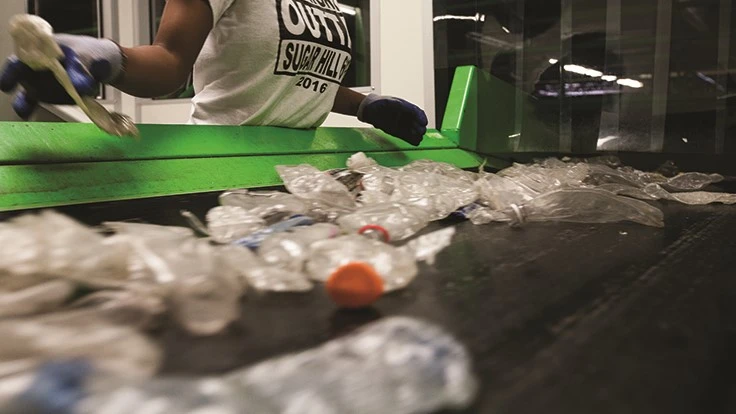
The National League of Cities (NLC) released a new report "Rethinking Recycling: How Cities Can Adapt to Evolving Markets," which analyzes how city leaders can develop resilient local waste management systems in response to China’s new regulations. The report marks the beginning of a larger effort to examine sustainability in solid waste management and is the first piece of literature to highlight how municipalities can benefit from China’s upcoming ban.
“In the face of adversity, city leaders have historically been our nation’s problem-solvers,” says Clarence Anthony, CEO and executive director of NLC. “China’s new policy is a wake-up call that we need to think more critically about waste management and cities now have the opportunity to strengthen domestic markets and chart a sustainable path forward.”
Historically, Chinese demand for materials to feed its manufacturing led it to purchase recyclables from all over the world. The rest of the industry relied on these sales to fund their collection operations. China’s new policy, National Sword, upends this approach, the NLC says.
Phase one institutes a ban specifically on mixed paper and plastics. By 2020, the second phase will ban all solid waste imports. This change could potentially diminish markets, cause market fluctuations and reversals and lower revenues, according to the report.
The U.S. exported 16 million tons of recycling commodities to China per year before the ban. In 2016, these shipments were worth $5.2 billion.
Many Americans recognize the importance of recycling to fight climate change, reduce pollution and limit municipal landfill costs. The recycling industry also accounts for 757,000 stable jobs, $36.6 billion in wages and $6.7 billion in state, local and federal tax revenues, the report says.
In addition, oceanic plastic contamination has come to the fore as a major international crisis. Inefficient waste management practices have led to 8 million metric tons of plastic being dumped in the oceans annually.
Durango and Fort Collins, Colorado, and Washington are a few cities using partnerships and educational campaigns to increase recycling rates and maintain local control over waste management systems.
Long-term recommendations for city leaders from the report include:
- Conduct an economic analysis of your current management operations.
- Work with contractors.
- Ensure fees and rates reflect current costs.
- Evaluate local policies and economic incentives.
- Explore local and unconventional markets.
- Consider streams.
- Examine asset ownership and consider infrastructure investments.
Read the full report here.
Latest from Recycling Today
- Greenwave Technology pares back losses in Q3
- Lindner shredders prepare Brazilian plastic for recycling
- China ups steel output while other nations cut back
- ReElement, Posco partner to develop rare earth, magnet supply chain
- Comau to take part in EU’s Reinforce project
- Sustainable packaging: How do we get there?
- ReMA accepts Lifetime Achievement nominations
- ExxonMobil will add to chemical recycling capacity





